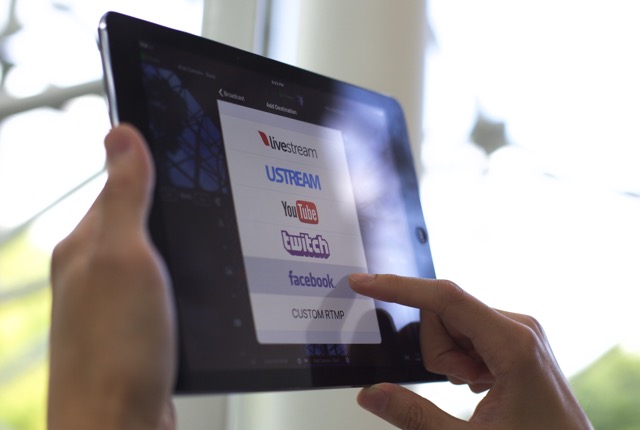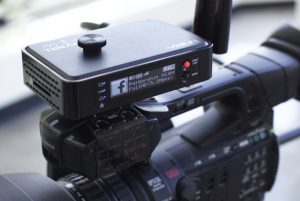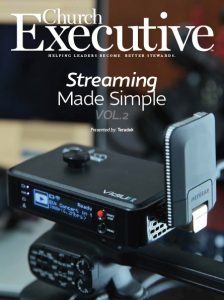
By Andrew Ng
Based on feedback from our church clients, we know three qualities that are absolutely essential to a quality live stream.
![]() #1: An online campus
#1: An online campus
This is one of the best things a ministry can have — somewhere social media followers, members and prospective members alike can go to find all the church’s news, content and media (including the live stream).
Generally, this online campus “lives” on the church website; however, a Facebook page is a great place to house it if your website isn’t up to the task.
 When streaming to Facebook, you can stream content to your own timeline or to someone else’s — if, for example, a new member wants to share his or her baptism with their network of friends. You can also stream that content to a Facebook group or page.
When streaming to Facebook, you can stream content to your own timeline or to someone else’s — if, for example, a new member wants to share his or her baptism with their network of friends. You can also stream that content to a Facebook group or page.
This is particularly effective because:
- Most people and organizations already have a Facebook page and following — including your church.
- Facebook just opened itself up to live streaming with its Facebook Live [live.fb.com] platform.
- All our company’s streaming solutions are equipped to broadcast to Facebook. So, it’s really easy to do.
- Facebook offers immediate, built-in interactivity. By design, viewers can chat with each other — and ask questions about what’s being presented — in real time.
So, there are a few different, compelling options for streaming to Facebook. And all this brings us to the next key quality of effective live streaming …
#2: Interactivity & engagement
 One thing every quality live stream has in common is audience engagement, whether it’s in real-time or post-broadcast. If you build engagement, people will come back. They’ll want to “talk.”
One thing every quality live stream has in common is audience engagement, whether it’s in real-time or post-broadcast. If you build engagement, people will come back. They’ll want to “talk.”
In fact, some churches have found the online campus experience is even more interactive than the live event. When people physically attend a worship service, they don’t necessarily feel free to talk with each other until afterward. Online, no such stigma applies.
Take, for example, online gaming — another space in which our products offer solutions. More often than not, the “Comments” box is overflowing. That’s why a company such as Twitch — a major online platform for video game broadcasting — continues to thrive: community.
To me, this kind of engagement has resonated within houses of worship, as well. It really makes the stream worthwhile.
#3: Reliability

The concept of being engaged is kind of like going to a movie. You go to a theater. It’s big — big enough to occupy your whole field of vision. It’s dark. You feel like you’re in the movie. But, any distraction (even a piece of dust on the projector) reminds you where you are. It takes you out of the moment.
Engagement in a live streaming event works the same way. If viewers experience a drop-out, or if the image quality is poor, it’s disengaging.
Because reliability matters — a lot — we’ve designed our products with professional TV broadcast requirements. By its nature, this keeps reliability at the forefront.
Get the right tools for the job
The first decision to make is what kind of content you’ll want to live stream. Then, you’ll need to decide how to capture the live video / content. Typically, this is done a few different ways.
First, there’s the traditional camcorder. If this is your chosen method, we offer devices — the Teradek VidiU product family, for example — that attach to the camcorder and stream the content to the internet. (As a more advanced approach, you could use a multiple-camera setup.)
If you prefer something more mobile, our Live:Air app lets you use your iPad to capture the video and stream it online.
Once content is online, you must decide how you will present it. If you want to offer a chat feature, quite a few content delivery networks / platforms can deliver. A few popular platforms are Wowza and Ustream; another is Churchstreaming.tv. Ultimately, however, you can use platforms that are available at no charge, including YouTube Live and Facebook Live.
Finally, a few words of advice before you go too far down the live streaming path: get a moderator.
This individual is the most important element in driving effective interaction between the online community and itself, and between that virtual community and the church. Here’s why.
A good moderator keeps the pace going. This person can review questions as they’re asked during the live stream, and pose them to the speaker — or to another person at the church who can intelligently respond to the queries — at the appropriate time.
If you’ve run a live event in the past, you know that expecting one person to respond to questions — as well as moderate the conversation — is a tall, potentially chaotic order. Such multitaskers do exist, however; so, if your church is blessed enough to have such a person on hand, definitely enlist his or her gifts for your live stream.
For church members, the ability to actually talk to someone from the ministry when they can’t attend in person is huge. It lets these important individuals continue to be active in the church.
And that’s what ministries are always hoping to cultivate: active members.
Andrew Ng is Director of Marketing at Teradek in Irvine, CA.


